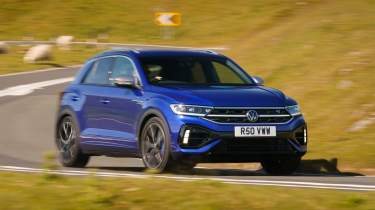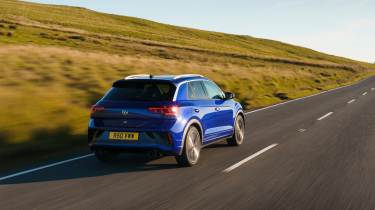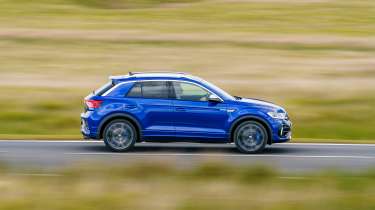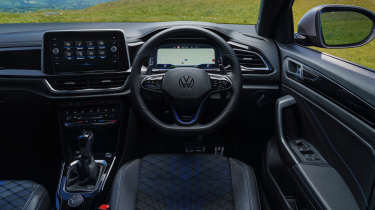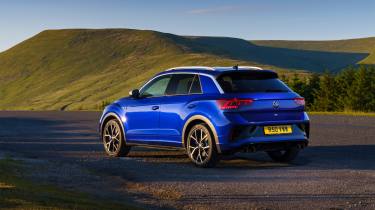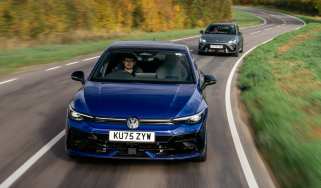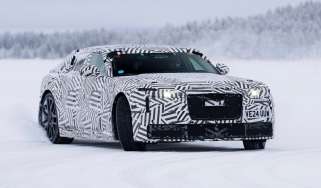Volkswagen T-Roc R 2025 review – a Golf R on stilts?
The T-Roc R packs Golf R running gear in a taller crossover body. Sounds exciting, but the results are mixed
Volkswagen’s T-Roc has become part of automotive furniture since it launched in 2017, but given how it blends in with most other cookie-cutter crossovers, you probably haven’t noticed. Sharing its platform with the Mk7 Golf, the T-Roc has been around since 2017 but received an update in 2022 to stay fresh, with a second-gen version due to arrive later this year with newer underpinnings.
The one we’re interested in is the T-Roc R, which first appeared in 2019 as a bonafide performance version, packing Golf R componentry in a taller more practical body. That means a turbocharged 2-litre engine with just shy of 300bhp, a DSG gearbox and four-wheel drive, as well as a lower, bespoke chassis setup. You can even have it with a titanium Akrapovič exhaust system.
Performance SUVs are a touchy subject among car enthusiasts, and while most of them are compromised, the best manage to be blindingly capable and entertaining in their own right. Does the T-Roc R pull the trick of feeling like a high-rise hot hatch, or should you sidestep it and go for an equivalent fast estate instead?
Engine, gearbox and technical highlights
It’s the familiar EA888 at play here – a 2-litre, four-cylinder turbocharged petrol engine making 296bhp and 295lb ft of torque through a seven-speed DSG gearbox. There’s a Haldex all-wheel drive system – badged 4Motion – to deploy that power, but being based on the Mk7 Golf, the T-Roc R doesn’t get the torque vectoring rear diff you’ll find in the Mk8 R. Still, the system can shift torque between the front and rear as required (in milliseconds, according to Volkswagen).
All that makes it good for a 0-62mph time of 4.9 seconds and a top speed of 155mph. The T-Roc’s chassis has been reworked to make use of that potential, with major changes being 20mm lower sports suspension, uprated brakes and the fitment of an aluminium subframe at the front for lower weight and extra stiffness. DCC adaptive dampers (with three stages of adjustment, rather than the 15 you get on latest Volkswagens) can be added for £1070, and the Akrapovič exhaust for £3870.
Performance, ride and handling
In isolation the T-Roc R is a quick, capable and energetic crossover with all the modes ramped up, but if you’ve driven a decent hot hatch (or indeed a Golf R) you can’t shake the sense that its higher centre of gravity and extra weight take some shine off everything from the ride, handling and braking to acceleration. It’s not a problem exclusive to the T-Roc – you get the same sense in Ford’s Puma ST or Hyundai’s now defunct Kona N – but if you’re looking for the best fast family car from a driving perspective, you’d be better served in something like the 328bhp Cupra Leon Estate.
Day-to-day the R is mostly calm and easy to drive. The ride is more unsettled than a Golf’s (hatch or estate), with more fidget and thumps even when in Comfort mode, but it’s firm rather than intolerable. The steering is calm and accurate, the engine is gutsy (even if the DSG is reluctant to change down on its own at times), so you can pootle around in the R as if it were a normal T-Roc.
Delving into the drive mode menu unlocks a sharper edge. Parameters like the steering, damping and powertrain response can be adjusted independently in Individual mode. Our favoured combination is the lightest steering setting, coupled with the raciest engine mode for extra zip and noise, leaving the dampers soft to avoid a tensed-up, jostling ride. The middle damper setting can provide useful extra control on smooth roads, but the stiffest mode is best avoided unless you find yourself on a track. Which you shouldn’t in a T-Roc, if we’re being honest.
It’s worth noting that even with the Akrapovič system, the T-Roc R’s mechanical noises aren’t much to listen to – the burble at idle is nice and there are crackles on the overrun, but the drone at high revs isn’t that appealing. But performance is still strong, the DSG still shifts cleanly and quickly, and the brakes still feel powerful, though a little more pedal feel at the top of its travel would be nice, for extra reassurance.
Wind the T-Roc up and it's possible to carry impressive pace. Its compact footprint gives you freedom to lunge into corners and carry momentum, keeping the engine on the boil using the paddles and parping onto the next straight. It’s not a car you can finely adjust through a corner (the Mk8 Golf’s torque vectoring rear diff would help) but it's spritely and at times, fun. Again, the biggest hindrance is the extra height over a proper hot hatch. It makes you feel a step removed from what’s happening beneath you, less in tune with how the car gets in, through and out of a corner. Next to newer crossovers it’s starting to feel its age, too. In top spec 328bhp trim the Cupra Formentor is quicker, more polished to drive and more entertaining, by virtue of its newer MQB Evo underpinnings and torque vectoring rear diff.
Interior and tech
The T-Roc is feeling its age inside too, being a mishmash of old-generation Volkswagen interfaces and (much maligned) newer ones. The MIB3 infotainment system is far from the cutting edge in terms of graphics, UI and features, although there are at least physical shortcut buttons next to the screen and a physical volume knob. Below you’ll find a climate control panel with haptic sliders, and there’s a fully digital dash behind the steering wheel, which can be configured to display full screen maps. The steering wheel is borrowed from the Golf R and gets haptic controls on the spokes – we’d much rather physical buttons.
Overall build quality is solid but hardly stellar, with extensive use of gloss black plastic finishes and not much in the way of thoughtful, tactile detailing. Overall, there’s a sense that the T-Roc is lumbered with an old-generation cabin and has been dressed up with newer tech – which is exactly the case. It’s certainly passable, but rivals like the Cupra Formentor feel more modern and feature rich.
Price and rivals
The T-Roc R starts at £45,465, undercutting the top-spec Cupra Formentor by more than £3k. Still, that’s a little too close to comfort when the Cupra rides on more modern underpinnings with a more powerful engine, more accomplished chassis and better tech. Cupra’s Ateca VZ2 is a more direct comparison to the T-Roc in terms of power and bodystyle, but more expensive again at £49,530.
Ford’s Puma ST is now only available in mild-hybrid form and isn’t as entertaining as it once was, and being from the class below, isn’t as roomy or premium as the Volkswagen. It is, however, nearly £12k cheaper.
If it were us, we’d steer past these crossovers and go for a fast estate for similar (or less) money. The value proposition is Skoda’s Octavia vRS, coming in at £41,070 with a 261bhp engine from the latest Golf GTI. For those wanting more power and four-wheel drive, Cupra will sell you a Leon estate with 328bhp for £47,570.
